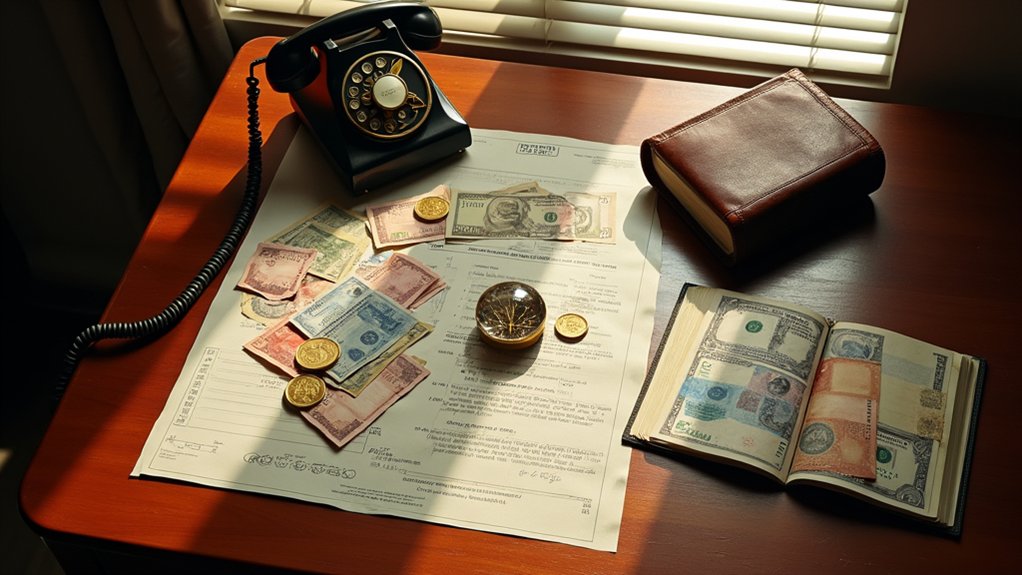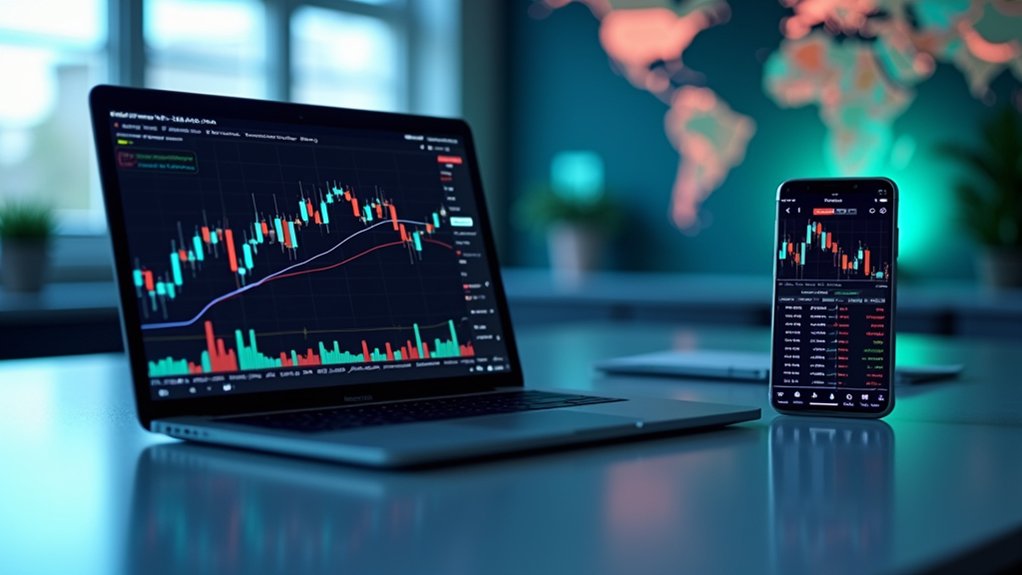Central banks run the forex show by tweaking interest rates, dumping or hoarding foreign reserves, and jumping directly into markets when things get messy. Rate hikes pull in foreign cash and pump up currency values, while cuts do the opposite. They sell dollars from reserves to prop up their own money, buy them to push it down, and coordinate interventions that can wreck traders positioned the wrong way. Their announcements move markets instantly, and the regime they choose—pegged, floating, or somewhere in between—sets the rules everyone else plays by.

Imagine this: Across the continent, from the Central Bank of Nigeria to the South African Reserve Bank, central banking authorities wield immense power over currency markets—power that African traders feel every single day. These institutions don't just observe forex markets. They shape them, manipulate them, and sometimes shake them to their core.
Interest rates are the most obvious tool. When the Bank of Ghana raises rates, the cedi suddenly looks more attractive to foreign investors. Higher returns mean capital flows in. The currency appreciates. Lower rates? The opposite happens. Money leaves, and the currency tanks. It's that simple, yet that devastating for traders caught on the wrong side.
Higher rates pull money in. Lower rates push it out. Traders caught between get crushed by forces beyond their control.
Then there's the matter of foreign exchange reserves. Central banks across Africa—from Egypt to Kenya to Mauritius—stockpile dollars, euros, and other hard currencies. They use these reserves like ammunition. Selling reserves floods the market with foreign currency, propping up the domestic one. Buying reserves does the reverse. It's market intervention dressed up in technical language. The Central Bank of Egypt has deployed this tactic repeatedly to defend the pound, sometimes successfully, sometimes not.
Direct market intervention goes even further. Imagine this: the naira is in freefall. The CBN steps in with spot transactions, swaps, coordinated maneuvers through authorized dealers. Sometimes they work with other central banks. Sometimes they go it alone. SARB has employed similar intervention strategies to stabilize the rand during periods of excessive volatility, balancing market forces with strategic currency operations. Either way, African traders watch helplessly as their positions get obliterated by institutional force they can't match.
Exchange rate regimes add another layer of complexity. Some African currencies float freely—or claim to. Others maintain pegs or managed floats. The West African CFA franc, used across Benin, Burkina Faso, Ivory Coast, Mali, Niger, Senegal, and Togo, remains pegged to the euro. The Central African CFA, spanning Cameroon, Chad, Congo Republic, Equatorial Guinea, Gabon, and Central African Republic, operates similarly. These pegs mean central banks must actively buy and sell to maintain fixed rates. Policy changes trigger chaos. More than 180 official currencies exist worldwide, though African traders typically focus on major pairs involving the dollar, euro, and pound alongside their domestic currencies. A fully flexible exchange rate gives central banks greater autonomy to pursue inflation targeting without the constraint of defending a fixed currency value.
Regulation matters too. Central banks license forex dealers, enforce compliance standards, publish market data. They decide who gets to play and under what rules. In countries like Nigeria, Kenya, and South Africa, regulatory announcements move markets instantly. The Central Bank of Kenya serves as a prime example, wielding regulatory oversight while deploying intervention mechanisms that directly shape forex trading conditions. Through monetary strategies that include policy rate adjustments and liquidity management, these institutions determine both short-term volatility and long-term currency trends. The Bank of Ghana's regulatory functions extend beyond simple oversight to encompass comprehensive monetary policy coordination that fundamentally shapes currency stability.
Communication is the final weapon. When the Reserve Bank of Zimbabwe issues inflation forecasts or the Bank of Morocco releases policy statements, traders scramble to interpret signals. Economic data drops create volatility. Forward guidance shifts expectations. Beyond maintaining macroeconomic and exchange-rate stability, these institutions fundamentally determine the playing field on which every forex transaction occurs.
Central banks control the game. African traders just try to survive it.
Common Questions
How Do African Central Banks Coordinate Forex Interventions With Neighboring Countries?
African central banks lean on regional platforms like PAPSS and REPSS to sync their forex moves. Monetary unions—CFA franc zone, Common Monetary Area, EAC—create formal channels for coordinated intervention. They share information through memoranda of understanding and colleges of supervisors. When shocks hit, they pool reserves and align policy.
Reality check: it's messy. Reserve levels differ wildly, fiscal discipline varies, and priorities clash. Gold helps some East African banks boost intervention capacity, but flexibility remains limited across the continent.
Can Retail Traders in Africa Access Central Bank Forex Auction Systems?
No. Retail traders in Africa cannot directly access central bank forex auction systems. Period.
These auctions are reserved for authorized dealers—typically commercial banks—who then supply forex to customers. Ethiopia, Zimbabwe, Egypt, and others all follow this institutional gatekeeping. Retail traders must go through banks, submit documentation proving transaction purpose, and accept whatever rates and margins the intermediaries set.
Even as some countries digitize and “liberalize” auctions, direct retail participation remains off the table. Banks stay in control.
Which African Central Banks Allow Direct Currency Trading With Mobile Money Platforms?
Nigeria's Central Bank allows direct eNaira-to-Naira swaps through approved mobile money wallets—real integration, not just talk.
Ghana's piloting e-Cedi with mobile platforms for Cedi-dollar trades via wallet apps.
Kenya, Tanzania, and Uganda are expanding M-Pesa, MTN MoMo, and Airtel Money to handle USD, EUR, GBP within the apps themselves.
PAPSS links central banks and mobile wallets across borders for multi-currency settlements.
Several West and Southern African central banks are testing digital currency FX swaps directly through mobile money.
Do North African Central Banks Follow Different Forex Policies Than Sub-Saharan Banks?
Yes, dramatically. North African central banks—Algeria, Morocco, Egypt—run tighter ships with inflation-targeting frameworks and moderate rate tweaks. Algeria cut 25 basis points in 2025.
Meanwhile, Sub-Saharan banks swing harder: Mozambique slashed 700 basis points since January 2024. North Africa enjoys relatively stable currencies through market-based approaches.
Sub-Saharan? Direct interventions, reserve requirement gymnastics, and brutal foreign exchange shortages despite decent reserves. Ethiopia's still wrestling acute FX crises while Tanzania keeps rates calm with corridor systems.
How Do African Central Banks Handle Forex Reserves During Currency Shortages?
African central banks triage hard. When FX reserves run low, they prioritize stabilizing exchange rates and covering essentials—fuel, medicine, food imports get first dibs.
Direct intervention smooths volatility, preventing panic devaluations. They split reserves into tranches: liquid cash for emergencies, longer-term holdings for yield.
Most aim for 3–4 months of import cover as a red line. South Africa rebuilt reserves past $50 billion post-crisis; Kenya hit its four-month target.
It's crisis management, not generosity.










